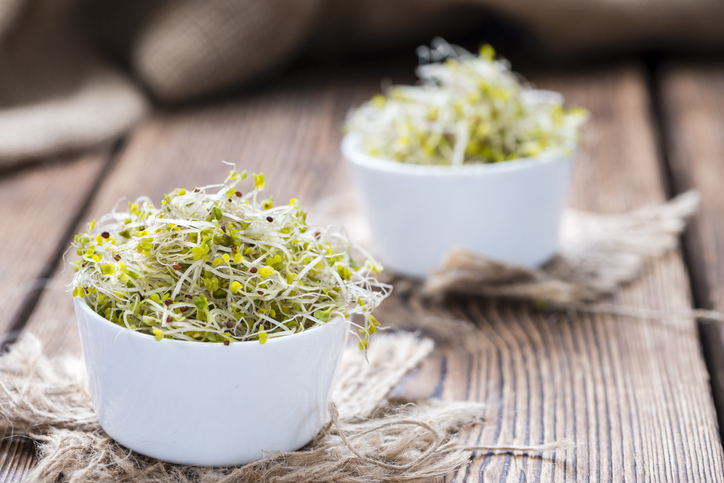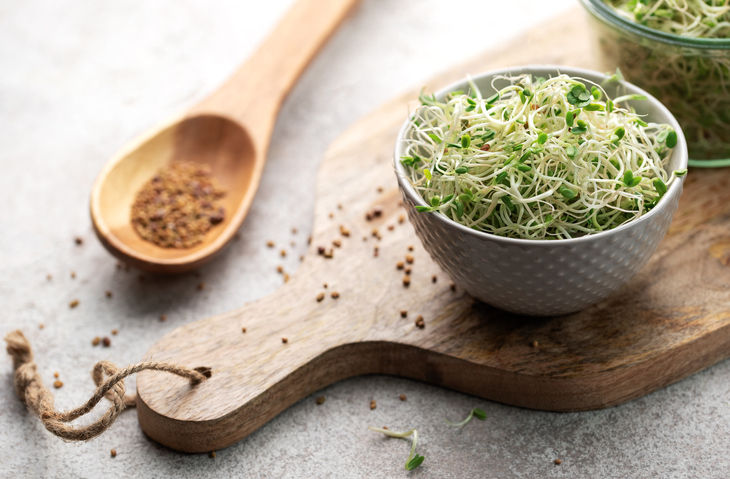Alfalfa sprouts — those delicate, crunchy shoots commonly added to salads and sandwiches — are more than just a garnish. These tiny greens pack a nutritional punch and have been praised for their health-promoting properties. But like many health foods, they come with some precautions.
In this article, we’ll explore the benefits and potential contraindications of alfalfa sprouts to help you decide whether they deserve a place on your plate.
What Are Alfalfa Sprouts?
Alfalfa (Medicago sativa) is a legume long used as animal feed and traditional medicine. The sprouts are typically harvested a few days after germination and eaten raw or lightly cooked. They have a mild, nutty flavor and are popular in health-conscious diets.
✅ Health Benefits of Alfalfa Sprouts
1. Nutrient-Dense Superfood
Alfalfa sprouts are low in calories but high in essential nutrients. Just a small handful provides:
- Vitamin K – supports blood clotting and bone health
- Vitamin C – an antioxidant that boosts immunity
- Folate – important for cell division and pregnancy
- Manganese, copper, magnesium – vital trace minerals
They also contain some protein and dietary fiber, helping you stay full longer.
2. Rich in Antioxidants
Alfalfa sprouts contain several plant compounds like flavonoids and saponins that act as antioxidants. These substances help combat oxidative stress, which contributes to aging and chronic disease.
3. May Help Lower Cholesterol
Some studies suggest that alfalfa saponins can help reduce LDL (“bad”) cholesterol levels without affecting HDL (“good”) cholesterol. This may support heart health when part of a balanced diet.
4. Supports Hormonal Balance
Alfalfa contains plant estrogens (phytoestrogens), which may help relieve symptoms of menopause such as hot flashes. However, this benefit is still being researched and may not apply to everyone.
5. Digestive Aid
Thanks to their fiber and enzyme content, alfalfa sprouts may support digestion and reduce symptoms like bloating or constipation.
⚠️ Contraindications and Safety Concerns
While alfalfa sprouts are healthy for many, they may not be suitable for everyone. Here’s what you need to know:
1. Risk of Bacterial Contamination
Raw sprouts, including alfalfa, are known to harbor E. coli, Salmonella, and Listeria, which thrive in the warm, moist conditions used during sprouting. This makes them risky for:
- Pregnant women
- Young children
- Older adults
- People with weakened immune systems
Tip: To reduce risk, cook sprouts briefly or buy pre-washed, packaged sprouts from reputable sources.
2. Autoimmune Conditions
Alfalfa contains L-canavanine, a naturally occurring amino acid that may trigger or worsen autoimmune conditions like lupus. There have been case reports linking alfalfa supplements and sprout consumption to lupus-like symptoms.
3. Estrogen-Sensitive Conditions
Due to their phytoestrogen content, alfalfa sprouts may not be recommended for people with estrogen-sensitive cancers (like certain types of breast or ovarian cancer). Always consult your doctor if you’re at risk.
4. Allergic Reactions
Although rare, some people may experience allergic reactions to alfalfa sprouts, ranging from mild itching to more serious symptoms like swelling or difficulty breathing.
Who Should Avoid Alfalfa Sprouts?
Avoid or limit alfalfa sprouts if you:
- Have lupus or another autoimmune disease
- Are pregnant or immunocompromised
- Are undergoing hormone-sensitive cancer treatment
- Have a known allergy to legumes or sprouts
How to Enjoy Alfalfa Sprouts Safely
- Rinse thoroughly before eating
- Consider lightly steaming to kill bacteria
- Store in the fridge and consume quickly
- Add to salads, wraps, smoothies, or soups just before serving

Alfalfa sprouts are a nutritious addition to a balanced diet, offering fiber, vitamins, antioxidants, and potential cholesterol-lowering benefits. However, they are not without risks — particularly when eaten raw or by those with specific health conditions. If you’re unsure whether alfalfa sprouts are right for you, a quick chat with your healthcare provider can help you make an informed choice.
Eat smart, stay safe, and enjoy nature’s tiny powerhouse — in moderation!

